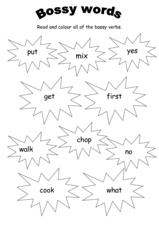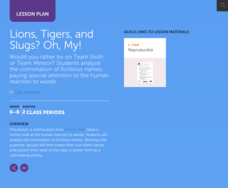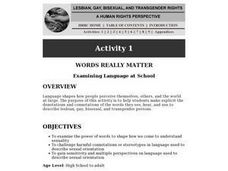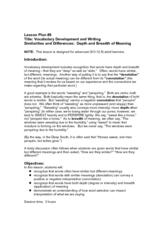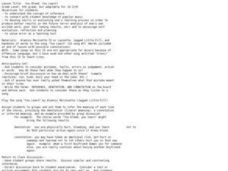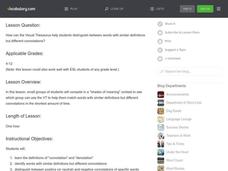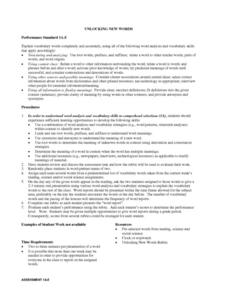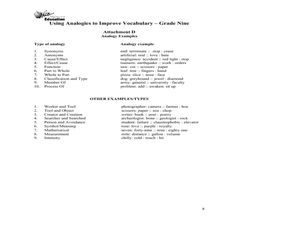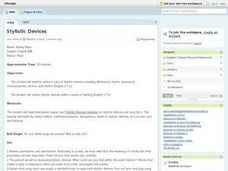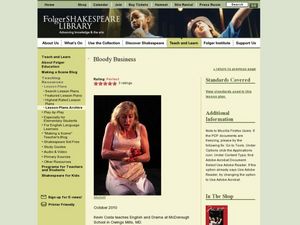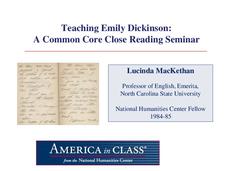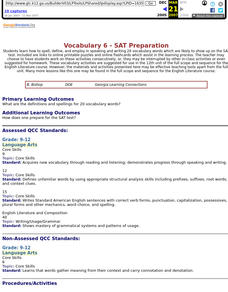Curated OER
Bossy Words
In this vocabulary worksheet, students examine 10 words and explore connotation as they denote the words that are bossy by coloring them.
Scholastic
Lions, Tigers, and Slugs? Oh, My!
Explore the power of words with your class by analyzing the connotations of fictitious sports team names. Learners discuss team names and the mental images they convey. They create logos to illustrate the meanings and connotations of...
Curated OER
Words Really Matter: Examining Language at School
Help your students gain sensitivity and become aware of the implications of the words they see, hear, and use about lesbian, gay, bisexual, and transgender people. After making lists of words or phrases they hear or use in school...
Curated OER
Vocabulary Development and Writing
Engage pupils in practicing denotative and connotative strategies to understand particular words. They work in pairs and write a series of sentences using each word that has a positive connotation and negative connotation. Some example...
Curated OER
You Bleed, You Learn?
Jump back into the 90s with Alannis Morissette's song "You Learn." After hearing the song, small groups analyze the lyrics and write an essay about a mistake they've learned from. Use the example sentences to identify the denotative and...
Shmoop
ELA.CCSS.ELA-Literacy.L.11-12.5
"Timid, scared, terrified." High school scholars examine words, their denotations and connotations, in a series of exercises that use lines from Shakespeare to explore figurative language and word relationships. Participants then...
Anti-Defamation League
Intent vs. Impact: Why Does it Matter?
Contrary to the popular saying, words can hurt. Words matter! Tweens and teens can reflect on how words impact others even if the intent wasn't how the words were perceived. After examining an Instagram post where Lizzo apologized for...
Deer Valley Unified School District
Close Reading: Analyzing Mood and Tone
The AP Literature and Composition exam is all about close reading. Test takers are presented with a passage and asked to analyze how an author uses literary devices to create a desired effect. Prepare your students for the exam with a...
K20 LEARN
Is Pizza Epic? Word Choice
Remember when everything was Fantastic! Fabulous! Awesome! Iconic! A series of activities encourages young writers to move beyond these overused descriptors and instead choose a more precise language.
Curated OER
Shades of Meaning
Students use words with similar meanings to analyze implied meanings. In this word connotation lesson, the teacher introduces the activity by asking students whether a new product should be advertised as "newfangled" or "cutting-edge." ...
Simon & Schuster
Classroom Activities for The Call of the Wild by Jack London
Three activities are designed for readers of Jack London's The Call of the Wild. First, class members research and create posters that reflect the setting of the novel. Next, groups create posters with images that represent each chapter...
Curated OER
Unlocking New Words
Students are introduced to the various types of suffixes and prefixes. In groups, they identify the root words and determine the proper suffix or prefix to add to the root. They complete a worksheet and review their answers to end the...
Curated OER
Using Analogies to Improve Vocabulary
Ninth graders analyze the relationships for pairs of words in analogical statements to infer word meanings. In this word meanings lesson, 9th graders complete an analogy pre-assessment, study a chart for using analogies to improve...
Curated OER
Don't Forget to Say Thanks
Students practice descriptive writing in a thank-you note format. In this descriptive writing lesson, students read the example letter and analyze the corrections in the letter. Students read the example thank you notes and focus on the...
Curated OER
"Words, words, words"
Learners discuss words that represent the "big ideas" in Othello and that recur throughout the play. They will be assigned words to track throughout the text, recording which character says the word and in what context.
Prestwick House
"Because I could not stop for Death" -- Visualizing Meaning and Tone
Emily Dickinson's "Because I could not stop for Death" provides high schoolers with an opportunity to practice their critical thinking skills. They examine the images, diction, rhythm, and rhyme scheme the poet uses and consider how...
Curated OER
Poetic Elements
Poetry is all about sound and rhythm. The sound of the words, the rhythm of the lines, and the emotional atmosphere created by these elements and the literary devices poets use, compress whole stories into a few stanzas. The specialized...
Curated OER
Stylistic Devices
Learners review connotation and denotation and stylistic devices in poetry. They read the lyrics to a song as it is being played and then discuss the meaning of the song. As a class, students read poems, share their thoughts, and...
National Endowment for the Humanities
Dostoevsky's Crime and Punishment
Pain and suffering do not have to be inevitable in a study of Crime and Punishment. A carefully scaffolded lesson introduces readers to the divided natures of the characters in Fyodor Dostoevsky's complex novel. Groups use the provided...
Curated OER
Bloody Business
Students research word frequencies in Macbeth and create a frozen picture inspired by a word. For this Macbeth lesson, students view Blood Will Have Blood and discuss the dual meaning of the word "blood." Students identify five major...
National Humanities Center
Teaching Emily Dickinson: A Common Core Close Reading Seminar
Three of Emily Dickinson's poems, "I like to see it," "Because I could not stop for Death," and "We grow accustomed to the Dark," provide instructors with an opportunity to model for class members how to use close reading strategies to...
Mr. Ambrose
The Great Gatsby, F. Scott Fitzgerald
Good discussion questions, quizzes, and tests teach as well as assess. Readers of The Great Gatsby will learn much from the materials in a 36-page packet designed to help students prepare for the AP Literature exam. Included in the...
Curated OER
Vocabulary 6 - SAT Preparation
Students discover how to spell, define, and employ in speaking and writing 20 vocabulary words which are likely to show up on the SAT test. Included are links to online printable puzzles and online flashcards.
Santa Ana Unified School District
Early American Poets
The poems of Walt Whitman and Emily Dickinson are the focus of a unit that asks readers to consider how an artist's life and changes in society influences his or her work. After careful study of Whitman's and Dickinson's perspectives on...


